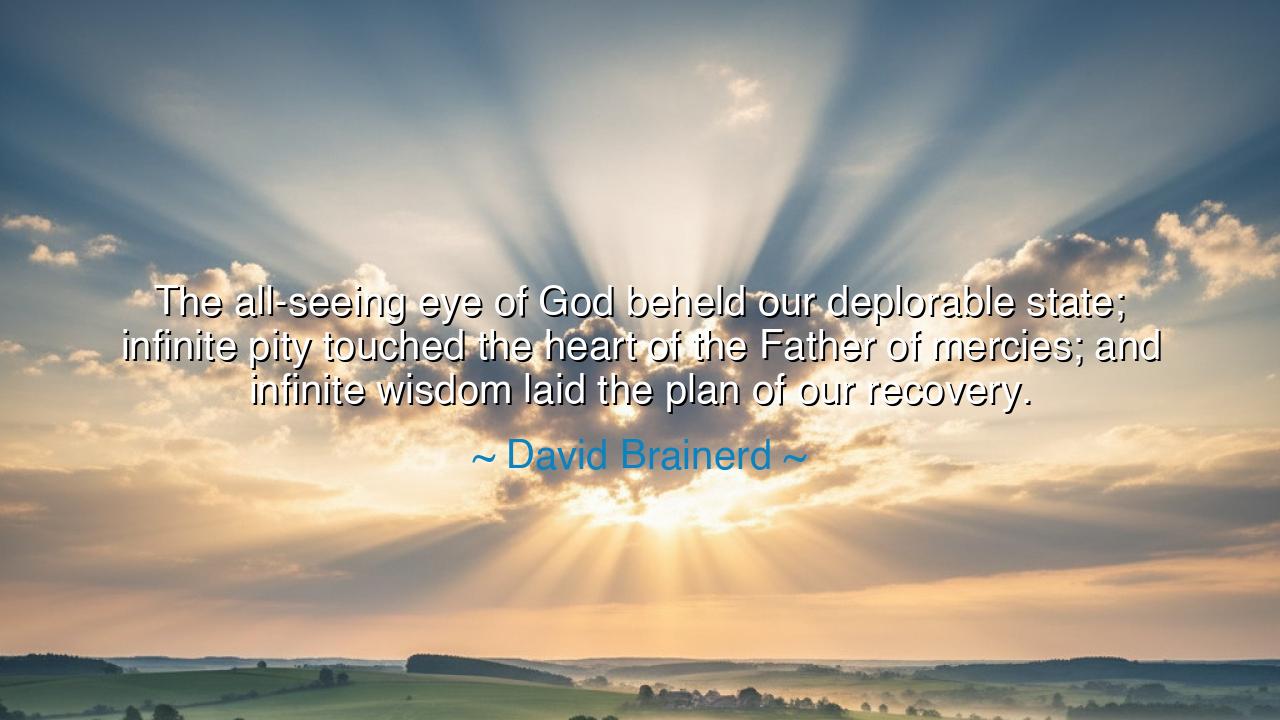
The all-seeing eye of God beheld our deplorable state; infinite
The all-seeing eye of God beheld our deplorable state; infinite pity touched the heart of the Father of mercies; and infinite wisdom laid the plan of our recovery.






In the words of David Brainerd, missionary and man of deep devotion, we are given a vision of both the frailty of mankind and the majesty of divine compassion: “The all-seeing eye of God beheld our deplorable state; infinite pity touched the heart of the Father of mercies; and infinite wisdom laid the plan of our recovery.” These words rise like a hymn of both sorrow and hope, reminding us that while humanity lies broken in weakness, the Creator does not turn away in coldness, but bends down in mercy, fashioning a path of redemption.
At the heart of this saying is the all-seeing eye of God. Nothing is hidden from His gaze—neither the secret sin nor the silent tear. Brainerd acknowledges that the state of humankind is deplorable, not because life is without beauty, but because the soul often wanders into corruption, despair, and estrangement from its Source. The greatness of God is not merely that He sees, but that He sees and still chooses mercy. His eye is not the eye of judgment alone, but the eye of compassion that moves toward rescue.
Here enters the image of the Father of mercies, whose heart is stirred not by wrath but by pity. In the ancient world, kings often looked upon the suffering of their people with indifference, caring only for power. But the God of whom Brainerd speaks is no tyrant; He is a Father, moved by the cries of His children. His infinite pity is not weakness but strength, for it is love that bends the heavens toward the earth. Like a shepherd leaving the ninety-nine sheep to seek the one lost, He comes near not to condemn, but to restore.
The ancients of faith testified to this truth. Israel, enslaved in Egypt, groaned beneath cruel masters, and Scripture declares that God “looked upon the children of Israel, and God had respect unto them.” From their deplorable state, He raised up Moses and delivered them. Later, in the fullness of time, Christians believe He sent Christ, the embodiment of both mercy and wisdom, to lay down His life for mankind’s recovery. Brainerd’s words, steeped in this tradition, remind us that the greatest plan of salvation was not born of accident, but of infinite wisdom.
History too offers a mirror of this divine pattern. Consider William Wilberforce, who looked upon the deplorable state of slavery in his day. His heart, moved with pity, could not rest until he joined wisdom with compassion, laying the foundations for the abolition of the slave trade. His actions echo Brainerd’s image: the recognition of suffering, the stirring of pity, and the crafting of a plan for recovery. Thus, even in human history, the rhythm of God’s mercy is reflected in those who act with both love and wisdom.
The lesson for us is profound: to be human is to be seen in our weakness, but to be loved is to be given a way of recovery. Just as God’s eye perceives us fully and still responds with compassion, so too must we look upon others—not with scorn for their failures, but with pity and resolve to help. The true measure of mercy is not in turning away from the broken, but in laying plans for their restoration, guided by wisdom and patience.
Practically, this means living with both eyes of compassion and hands of wisdom. When you see the suffering of others, let pity move your heart, but do not stop there. Ask what plan, what action, what path may lead them to recovery. In your own life, when you stumble into a deplorable state, do not despair, for the all-seeing eye does not condemn without offering renewal. Seek mercy, walk the path of wisdom, and know that even from the lowest depths, recovery is possible.
So let us remember David Brainerd’s wisdom: God sees, God pities, and God restores. The divine gaze is not one of abandonment but of eternal compassion. And as children of this mercy, we are called to do the same—to see, to be moved, and to act wisely in bringing healing to others. For in mercy joined with wisdom lies the power not only to endure but to transform, to rise from the depths into the light of new life.






AAdministratorAdministrator
Welcome, honored guests. Please leave a comment, we will respond soon